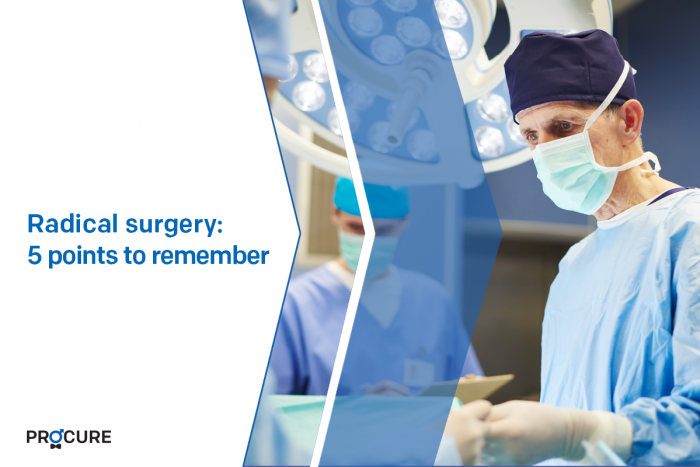If you’ve been diagnosed with prostate cancer, your doctor will consider many factors before recommending the best treatment. For many of you, this may mean completely removing the prostate, which is radical surgery. Here are 5 points to remember if you are considering this option.
- Radical surgery: Is it for you?
Radical surgery is the most common surgical procedure to treat low-risk, intermediate-risk, or high-risk localized prostate cancer. It is usually done with the aim of curing prostate cancer because it can remove all cancer cells. It can be used in combination with other treatments, for example, surgery followed by radiotherapy, if necessary. However, this is the most aggressive treatment and therefore carries a greater risk of side effects. Radical prostatectomy, its real name, is major surgery. It is a very effective treatment, but patients are understandably concerned about the complications.
- A complex procedure that requires an experienced surgeon
During this procedure, the surgeon completely removes your prostate and part of the tissues that surround it, including your seminal vesicles (small pockets of fluid that feed and store your sperm). This operation is complex and requires a high level of technical precision, as the prostate is surrounded by nerves and structures important for normal urinary and sexual functions. It requires general anesthesia and a hospital stay of one to four days. You will leave the hospital with your catheter (a tube inserted through the penis called a urethral catheter) which will drain your urine from the bladder into a collection bag for one to two weeks. This paraphernalia is a little uncomfortable, but invisible under clothing and not very inconvenient. Of note, your urine may be stained with blood. Do not worry about that.
- Urinary incontinence
After surgery, virtually all men have a period of transient urinary incontinence. It can last from a few weeks to a few months (average three to six months). For some men, patience will be required as recovery can take longer (six to nine months) and even up to two years. It varies from person to person depending on the degree of disease, age and state of health. It usually goes away with time. To make incontinence last as short as possible, you can start by doing Kegel exercises before and after your surgery and consult a physiotherapist to learn how to do them more effectively. You could be referred to this specialist if you have not regained control of your continence six months post-surgery.
- Erectile dysfunction
Do not confuse erectile dysfunction with desire and orgasm. After surgery, virtually all men have a transient period of erectile dysfunction. A high percentage of men regain their erectile function one to 36 months after surgery, often with medical help. Different degrees of erectile dysfunction are common as a result of this procedure, even when the surgeon is preserving your erectile nerves. How quickly and how well sexual function improves depends on your preoperative sexual function, your age, and your medical condition.
- You need to invest time and effort in your recovery
You will need to get involved and collaborate with your urologist or physiotherapist to recover your continence and your erections. All of this requires patience, perseverance and resilience. In other words, to participate in a marathon, you have to jog and train. The good news is that there are many strategies that can help you manage them. Don’t hesitate to talk to your doctor. And talking about it openly with your partner helps ease the tension, so you can make room for your imagination in complete privacy.
Take the time to visit each of our pages on this website, as well as our YouTube channel, in order to get familiar with the disease with our expert lectures, our section on available resources, the support that is offered to you.
Do you have any questions or concerns? Above all, do not hesitate. Contact us at 1 855 899-2873 to discuss with a nurse specializing in uro-oncology. It’s simple and free, like all our services.
A webinar that might interest you (in French only)
Tout sur la chirurgie radicale – Avril 2021
Pages of our site that might interest you
Want to know more? Just click on one of the links below.
Everything to know about radical prostatectomy
Managing side effects
PROCURE news that may interest you
Each week, we publish a blog article. Here are a few for you.
Recovery timeline after surgery
Active re-education of the penis after your surgery
Do Aphrodisiac diets exist?
Written by PROCURE. © All rights reserved – 2021



 ADDITIONAL RESOURCES
ADDITIONAL RESOURCES

